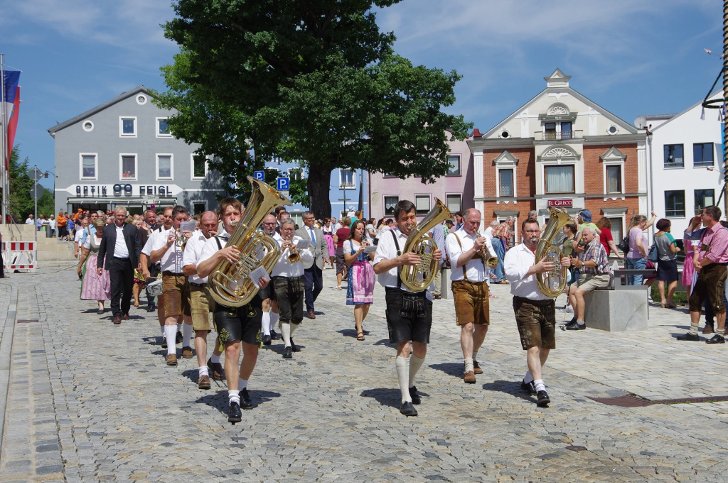Pichelsteiner Eintopf, or simply Pichelsteiner, is a thick stew popular in Bavaria. It contains several kinds of meat (usually beef, pork and mutton) and vegetables such as carrots, potatoes, parsley roots, cabbage, and leek. The meat is seared, then the vegetables are added to the pot based on their cooking time. Finally, meat broth is poured over the meat and vegetables, and everything is cooked together. Depending on the region, the dish may also include diced onions and/or garlic. In Swabia, the stew is garnished with bone marrow left over from making the broth.
The dish is believed to have been created in the mid-19th century by Auguste Winkler (née Kiesling), who came up with the recipe while working as an innkeeper in Grattesdorf. The name “pichelsteiner” is most likely derived from Büchelstein, the name of a nearby mountain that its pronounced close to “Pichelstein” in the local dialect.
The Pichelsteinerfest was first celebrated in Regen in 1874. It originated as a small gathering of four local residents, who came together on Kirchweih Monday (a church holiday dedicated to the local patron saint) to cook Pichelsteiner in a large cauldron and enjoy it together. They repeated the gathering the next year, and soon the Pichelsteinerfest became a permanent fixture in Regen’s calendar of events.
In the early 20th century, the Pichelsteinerfest expanded into a large-scale folk festival that attracted not only locals but also tourists from other parts of the country. Its main highlight was a parade, followed by a ceremonial distribution of Pichelsteiner. Since then, the Pichelsteinerfest has become one of the most popular and anticipated festivals in Bavaria.
The Pichelsteinerfest Festival usually begins on the Friday before the first Sunday after St. James Day (July 25) and lasts for six days. The festival schedule has been the same for years: a gondola ride and water games on Saturday, a parade or motorcade on Sunday, a craftsman’s day with a craft rally and Pichelsteiner feast on Monday, an agriculture and forestry day on Tuesday, and events for children and senior citizens on Wednesday, followed by the closing fireworks display.
During all six days of the festival, there is music, delicious food and beer, and fun entertainment at the amusement park. Interestingly, the weather is almost always nice during the six days of the festival, even when it is bad right before and/or after the event, which is why it is referred to as Pichelsteiner weather (Pichelsteinerwetter).
The festival could not take place in its full glory in 2020 and 2021 due to the COVID-19 pandemic. However, some events were held to give people a small taste of the Pichelsteinerfest. Various vendors offered to order takeout, including the festival’s signature dish. In both years, there were also romantic water features and the final fireworks display.

Photo: pichelsteinerfest.com




